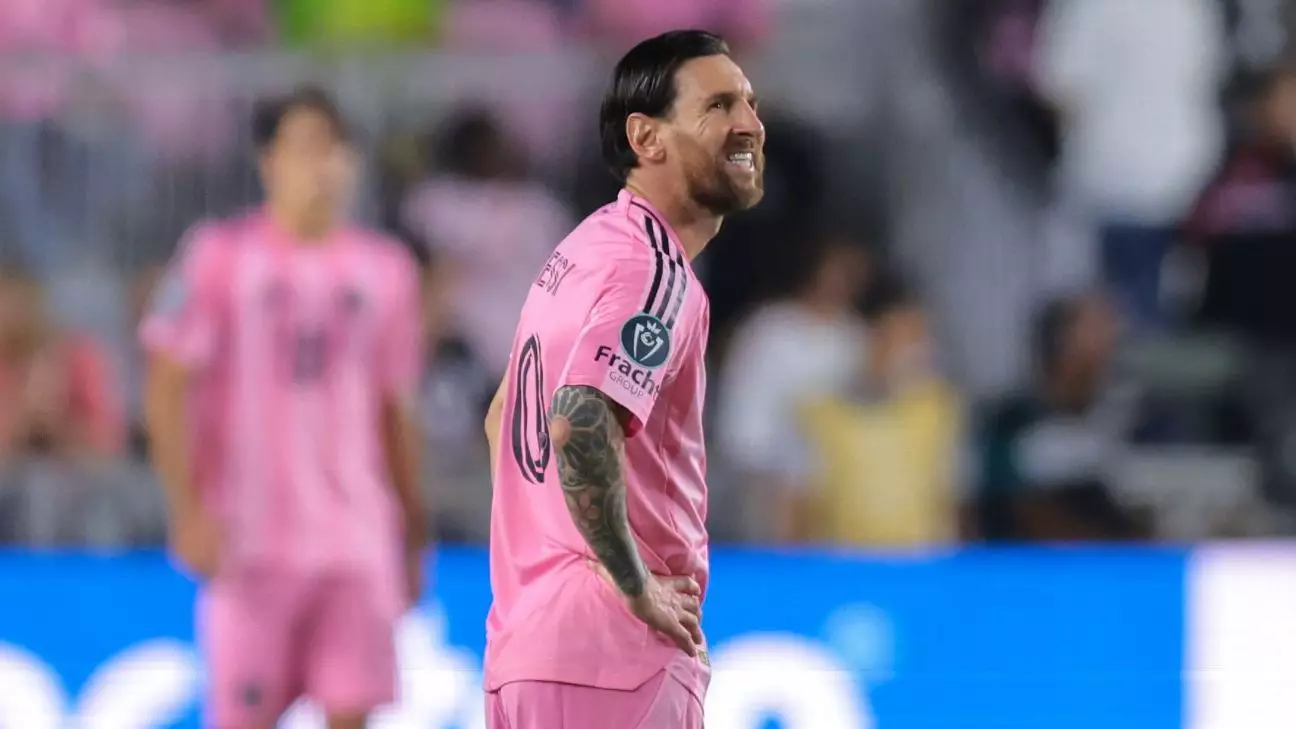Inter Miami CF’s ambitions have been sky-high since the arrival of global icon Lionel Messi and a constellation of international talent. Yet, as demonstrated in their latest knockout rounds, the club’s reality starkly contrasts the lofty expectations set upon their shoulders. Having entered the Concacaf Champions Cup semifinal with a monumental 2-0 deficit, hopes were high for redemption at Chase Stadium—but the crushing 5-1 aggregate score against the Vancouver Whitecaps not only extinguished the fire of optimism but also left fans grappling with a familiar sting of disappointment.
A Tumultuous Homecoming
As the match commenced, the atmosphere at Chase Stadium was electric—a perfect setting for a showdown of epic proportions. The fans, adorned in pink and roaring with passion, exuded a fervor that seemed to promise a miraculous comeback. However, as the clock ticked down to the 72nd minute, the stadium transformed from a cauldron of excitement to a cryptic silence broken only by the sobering scoreline: MIA 1, VAN 3. What began as a hopeful narrative quickly devolved into a tale of unfulfilled aspirations and disheartening defeats.
In the moments following the final whistle, the palpable disappointment lingered in the air as supporters clapped reluctantly—umpteen hearts broken as the team’s effort faded into hasteful exits. Messi, once the beacon of creativity and promise, with head bowed low, epitomized the muted emotion that enveloped the team and fans alike. A far cry from the exuberance that marked their initial successes, the questions regarding the team’s lack of silverware began swirling once more.
Unfulfilled Expectations
Since that initial spike of success during the Leagues Cup, Inter Miami has been locked in a seemingly endless cycle of mediocrity. Their efforts to fortify the squad, evidenced by the acquisitions of promising talents like Telasco Segovia and Tadeo Allende, promised to change the trajectory of the team’s fortunes. Coupled with the hiring of Javier Mascherano—an attempt to channel his expertise into a championship-caliber squad—the vision of triumph seemed plausible. Yet, with each passing season, the same haunting refrain echoes through the hearts of the supporters: where are the trophies?
Mascherano’s ambitious proclamations about ushering in a new era were met with fervent optimism. However, the harsh reality of competing against the titans of Liga MX and within a uniquely structured MLS league stirred pessimism and skepticism within the fans. Despite the waves of talent that followed Messi to Miami, the persistent struggle transcended coaching strategies and recruitment methods; it spoke to a fundamental issue within the team’s composition and psychology.
The Recurrent Cycle of Disappointment
History tends to repeat itself, especially in the world of sports, and Inter Miami has become acutely aware of this trend. Last season’s lamentable exit against CF Monterrey reverberated loudly in the minds of supporters, as many recalled head coach Tata Martino’s lament about MLS roster constraints. Mascherano’s formation of a “winner’s mindset” and the intention to conjure international stardom has yet to materialize into tangible results, leaving a bitter aftertaste among the loyal fans.
In their recent semifinal bout against Vancouver, Miami did not lack for effort, as players sprinted and charged with unwavering determination. They dominated the early proceedings with stunning interplay that culminated in a gorgeous goal from Jordi Alba, with an assist from compatriot Luis Suárez. Yet this fleeting moment of brilliance was tragically overshadowed by defensive blunders that became the hallmark of Miami’s undoing throughout the match.
As the second half progressed, a disheartening transformation occurred; the initial composure of the squad crumbled under the pressure of desperation. Mistakes that would typically be brushed aside became glaring errors, culminating in two quick goals from the Whitecaps that decimated Miami’s hopes of a comeback. Here, we find the crux of the issue: the psychological framework of the team faltered when confronted with adversity, encapsulating the fragility that often plagues even the most talented rosters.
The Clock is Ticking
Sergio Busquets’s reassurances of a brighter future feel increasingly hollow with the pressure mounting on not just the team, but also the aging stars—Messi, Suárez, Alba, and Busquets—whose contracts end after the imminent 2025 season. The clock is ticking, and as they march toward potential retirement or shifts elsewhere, Inter Miami’s vision of success risks leading them to a stark and empty trophy case.
While the team still has opportunities in upcoming competitions—MLS, the Leagues Cup, and the Club World Cup—time is not on their side. The pressure to deliver for their devoted fan base grows with each passing match. The club is on the edge of redefining its legacy, but the arduous journey ahead raises a critical question: will they finally convert their star-studded lineup into the glorious accolades that Mas initially promised, or will they once again be left to ponder what might have been? The haunting echoes of disappointment serve as a maddening reminder that in football, even the brightest stars cannot illuminate a path to glory if the foundational elements are not firmly in place.

